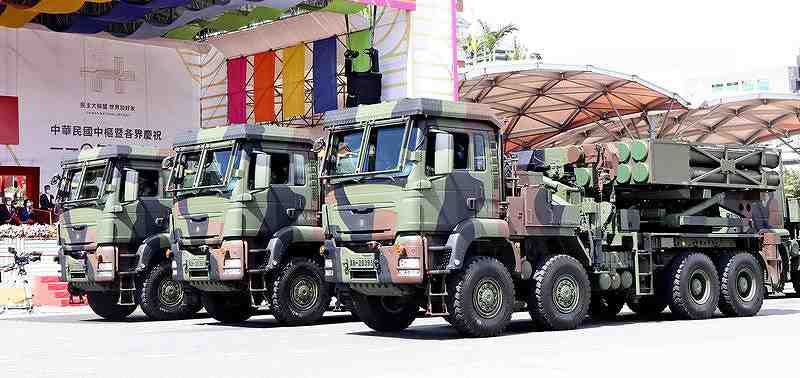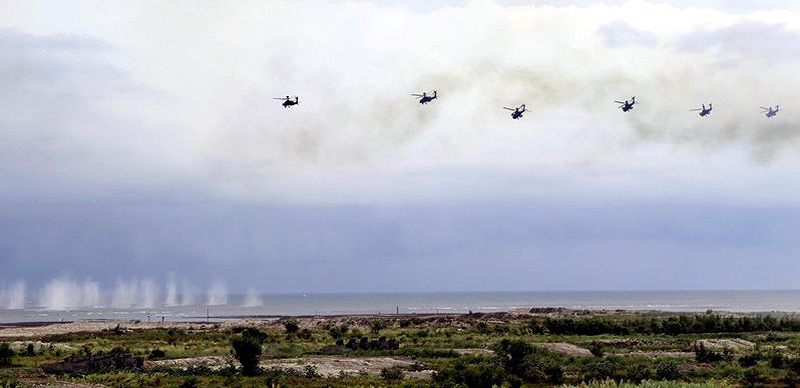
Taiwan military vehicles are driven during a ceremony on Oct. 10 in front of the Presidential Office Building in Taipei.
November 18, 2021
TAIPEI — If China invaded Taiwan, to what extent would the Taiwan military be able to defend the island? The actions of the U.S. military, which has supported Taiwan, would be a decisive factor. But even more important is the capacity of Taiwan itself. The island is in a hurry to strengthen its defense capabilities amid escalating intimidation by the Chinese military.
The collapse of the Afghan government following an offensive by the Taliban that coincided with the withdrawal of U.S. troops from Afghanistan in August triggered shockwaves in Taiwan.
The U.S. military pulled out of Afghanistan as planned despite the turmoil.
“American troops cannot — and should not — be fighting and dying in a war that Afghan forces are by and large, not willing to fight and die in themselves,” U.S. President Joe Biden said.
Anxiety has erupted in Taiwan, with one person saying: “The United States has abandoned even its allies. Today’s Afghanistan is tomorrow’s Taiwan.”
Taiwan President Tsai Ing-wen, who is also the commander in chief of the Taiwan military, issued a swift statement, saying, “Taiwan’s only option is to make itself stronger, more united, and more determined to defend itself.”
She affirmed that the first thing Taiwan should do is strengthen its defense capabilities, rather than be concerned about how the U.S. military would act, which is in line with Biden’s statement.
“Only if you help yourself can others help you,” Taiwan Premier Su Tseng-chang said.
Comparing the war potential of their militaries, China outclasses Taiwan in terms of land, sea and air forces.
In anticipation of an invasion, the Taiwan military envisions an asymmetric approach that would not involve a head-on confrontation with the Chinese military. For example, the Taiwan Coast Guard’s high-speed patrol ships equipped with anti-ship missiles could be used to intercept China’s carrier strike group.
A variety of missiles launched from land, sea and air could be used in asymmetric warfare, or warfare between opposing forces that differ greatly in military power.
Su Tzu-yun, a research fellow at the Institute for National Defense and Security Research, said: “400 missiles could be procured for $1 billion, the price of a frigate. Taiwan should become an ‘unsinkable Aegis vessel.’”
The military’s defense strategy divides combat modes into two stages: “decisive battle in the littoral zone” and “destruction of the enemy at the landing beach.”

A live-fire exercise is held in Taichung, Taiwan, in July 2020.
The former is aimed at making it difficult for Chinese landing forces to carry out their operations by subjecting them to concentrated missile attacks when they are gathering in ports or transporting troops by sea.
Of course, the Taiwan military would never initiate fighting, but Su stressed the importance of the missiles as a deterrent.
“If the Chinese Communist Party failed a high-risk attempt to invade Taiwan, it would become a serious political issue at home,” he said.
Taiwan’s Defense Minister Chiu Kuo-cheng told parliament in October that China would have the capability to mount a full-scale invasion of Taiwan by 2025, citing the fact that its cutting-edge weapons would be expected to reduce the losses incurred by landing troops and other units.
According to military expert Chieh Chung, an associate research fellow at the National Policy Foundation, Chinese landing forces will be able to transfer from large vessels to smaller, harder-to-target landing craft outside the range of Taiwan’s main missiles by around 2025.
Now it is assumed that the switch from transportation fleets to landing craft would be done around 40 kilometers off Taiwan’s shores, but the distance will be extended to about 70 kilometers.
Moreover, with the introduction of high-speed hovercraft and helicopters, the time to get from transfer points to the Taiwan coastline is expected to be reduced from the current four hours to about 30 minutes.
Taiwan’s battle plan would collapse under such circumstances.
In October, Taiwan’s defense ministry submitted to the parliament a special budget of 240 billion Taiwan dollars (about ¥960 billion) for a five-year period from 2022, mainly for equipment enhancements to extend its capabilities in the event of a battle in the littoral zone.
The main pillars of the budget will be the construction of high-speed naval vessels, mass production of long-range missiles and production of missiles for use on patrol vessels.
Taiwan also needs sufficient air force capability to maintain control of its airspace and sufficient ground forces that would be able to hold up for a certain period of time in the event of a landing.
The initial defense budget for 2022 has been set at NT$372.6 billion (about ¥1.49 trillion), an increase of about 3% over the previous year. A special budget of NT$40.1 billion (about ¥160 billion) was also set aside for the purchase of 66 F-16 fighter jets from the United States.
In a recent interview with CNN, Tsai confirmed that U.S. military personnel are being sent to Taiwan to help train its military.
Cooperation with the U.S. military is an “open secret,” according to military experts, but it is unusual for the Taiwan president to admit the fact. Tsai may have thought that daring to reveal the presence of U.S. troops in Taiwan would help to enhance deterrence capabilities against China.
For Taiwan, which is inferior in terms of military power, information and diplomatic tactics are indispensable for strengthening its defense capabilities.
Tsai has referred to Taiwan as a “beacon” of democracy. In recent years, the United States, Japan, the European Union’s member states and other countries which share that sentiment have moved to strengthen ties with Taiwan.
In addition to the U.S. military, British and Canadian naval vessels have passed through the Taiwan Strait. Also, Japan, the United States, and countries in Central and Eastern Europe such as Lithuania have provided Taiwan with COVID-19 vaccines to support the Tsai administration, which was temporarily rocked by a vaccine shortage.
Taipei’s alliance with Washington and other democracies has been a strong deterrent to Beijing, which sees Taiwan as a breakaway province that it has vowed to retake by force if necessary.
An expert on China-Taiwan relations in Taipei said, “In the face of Taiwan’s skillful diplomacy, China is starting to feel some desperation.”
Top Articles in World
-

Israeli Ambassador to Japan Speaks about Japan’s Role in the Reconstruction of Gaza
-

Videos Plagiarized, Reposted with False Subtitles Claiming ‘Ryukyu Belongs to China’; Anti-China False Information Also Posted in Japan
-

North Korea Possibly Launches Ballistic Missile
-

Chinese Embassy in Japan Reiterates Call for Chinese People to Refrain from Traveling to Japan; Call Comes in Wake of ¥400 Mil. Robbery
-

Russia: Visa Required for Visiting Graves in Northern Territories, Lifting of Sanctions Also Necessary
JN ACCESS RANKING
-

Japan PM Takaichi’s Cabinet Resigns en Masse
-

Japan Institute to Use Domestic Commercial Optical Lattice Clock to Set Japan Standard Time
-

Israeli Ambassador to Japan Speaks about Japan’s Role in the Reconstruction of Gaza
-

Man Infected with Measles Reportedly Dined at Restaurant in Tokyo Station
-

Videos Plagiarized, Reposted with False Subtitles Claiming ‘Ryukyu Belongs to China’; Anti-China False Information Also Posted in Japan
























